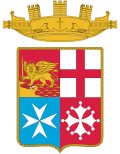This article needs additional citations for verification .(December 2016) |
 | |
| History | |
|---|---|
| Name | Stella Polare |
| Namesake | Stella Polare (Pole star ship) |
| Builder | Cantiere Sangermani, Chiavari (Genova) |
| Laid down | 1964 |
| Launched | 15 September 1965 |
| Commissioned | 8 October 1965 |
| Home port | La Spezia |
| Identification |
|
| Status | In service |
| General characteristics | |
| Type | Yawl |
| Tonnage | 48 t (47 long tons) full load |
| Length | |
| Beam | 4.89 m (16 ft 1 in) |
| Height |
|
| Draught | 3.01 m (9 ft 11 in) |
| Propulsion |
|
| Sail plan |
|
| Speed | 7 knots (13 km/h; 8.1 mph) by engine prop |
| Range | 500 nmi (930 km; 580 mi) at 7 knots (13 km/h; 8.1 mph) (on engine prop) |
| Complement | 16 |
Stella Polare (A 5313) is a yawl, active as a sails training vessel for the Italian Navy (Marina Militare). [1]
